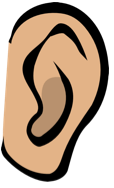Protect Your Ears
Everyday, life is becoming toxically noisy and hearing loss is occurring earlier in life. In fact, 26 million Americans have hearing loss and, unlike other overuse syndromes, most hearing loss problems are cumulative and, unlike other overuse injuries, hearing loss is permanent.
HEARING LOSS IS PERMANENT!
Here are a few prevention strategies:
1) Practice more softly.
2) Avoid practicing in small rooms with hard surfaces. We all sound fabulous in a small tiled room, but such spaces are harmful to our hearing.
3) Distance yourself. Whenever possible, increase the space between you and the noise.
4) Use Plexiglass shields and hearing protection. The Etymotic Research ER-15 & ER-25 Musicians Earplugs are deep-fitting, custom-fitted ear plugs that one can play with, and they are very effective in reducing the decibel level by 15 or 25 dBA . But store-bought earplugs work too! Carry them wherever you go, and remember that cotton or tissue doesn’t work!
5) Minimize your exposure. Our ears are subject to constant abuse, both on and off the stage. Avoid exposure to environmental noise as well. Noise directly contributes to hearing loss and a debilitating condition called Tinnitus or an incurable “ringing or roaring in the ear.” Be vigilant about your exposure, both on the job and off. Wear ear protection when you are exposed to loud music or when you operate power tools.
6) Alternate your repertoire. Whenever possible, alternate noisy pieces of music with quieter ones. This protects you from overusing one particular muscle group as well as your ears.
7) Avoid air travel when you are congested due to a cold or sinus or ear infection. Serious damage can occur with changes in air pressure. If travel is imperative, consider using a decongestant and use a nose spray when you put your seatbelt on, and again prior to landing if you’ve flown four hours or more.
8) Take breaks. Take a 10-minute break every hour for both your body and your ears. Go to a quiet room after a particularly bombastic rehearsal or performance. If you go to or perform in a loud concert on Friday, don’t mow your lawn on Saturday. Give yourself a 16-18 hour auditory rest period whenever possible.
9) Violinists: protect your left ear. A violinist’s left ear is bombarded with sounds as high as 100 decibels coming out of the F-hole – about as much sound as a sporting event and almost as loud as a French horn! At least when you practice, use hearing protection in that ear.
10) Hum! When you might be caught without your earplugs, hum. Humming or grunting just prior to a loud noise, like a cymbal crash, and sustaining the hum through the sound gives significant protection. This is because we have a small muscle called the stapedial muscle which, when contracted, partially blocks loud sounds from getting through to cause damage.
- 1. Hypersensitivity to sound where even normal sounds seem loud or even painful.
- 2. Trouble hearing in noisy situations.
- 3. Trouble discerning consonants such as P, T, B, and D.
- 4. Trouble discerning subtle shadings, colors, or overtones.
- 5. A single tone sounds as a different pitch in each ear.
- 6. Any ringing in the ears.
- 7. A tendency to speak loudly.
- 8. Turning up the volume on your TV, telephone, DVD player, or iPod, especially after a performance.
Hearing loss is a combination of factors. You can sustain hearing loss at any age if you are exposed to noise that is Too Loud, Too Close to you,and you are exposed to it for Too Long a time.
BEWARE: Headphones, and iPods can be dangerous to your ears!
Your ears are your most important asset, if you are a musician.
From Janet Horvath’s
Playing (less) Hurt; An Injury Prevention Guide for Musicians
Available for $23.95 at www.playinglesshurt.com
© 2002 and 2006 Janet Horvath


No comments yet.
Add your comment